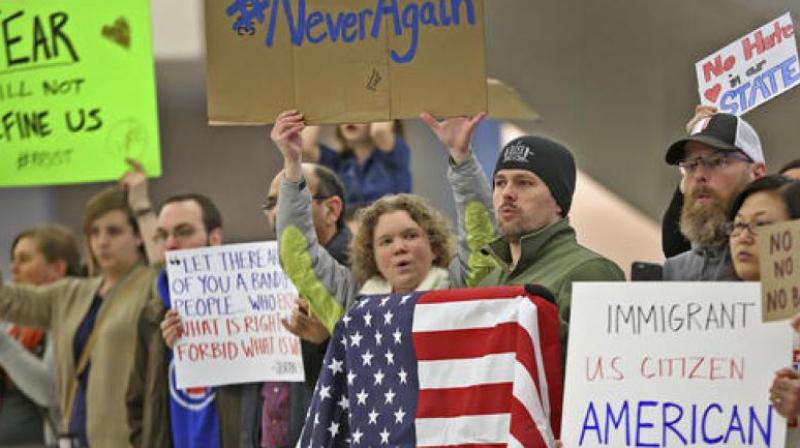How legal challenges to Trump travel ban are playing out

Washington: Legal battles are playing out across the US as opponents of President Donald Trump's travel ban on citizens from seven predominantly Muslim nations take their fight to the courtroom. Hearings were being held on Friday in a few of the cases.
A look at some of the court challenges:
Washington
A federal judge in Seattle has temporarily blocked President Donald Trump's travel ban.
US District Judge James Robart granted a temporary restraining order on Friday at the request of Washington state and Minnesota that's effective nationwide.
Lawyers for the US government argued the states don't have standing to challenge the order and said Congress gave the president authority to make decisions on national security and admitting immigrants.
Washington Attorney General Bob Ferguson had sued, saying the order is causing significant harm to residents and effectively mandates discrimination. Minnesota joined the suit this week.
Massachusetts
A federal judge in Boston has declined to extend a temporary injunction against President Donald Trump's travel ban. But a separate federal ruling in Seattle later in the day put the ban on hold nationwide.
U.S. District Judge Nathaniel Gorton in Boston declined Friday to renew an order prohibiting the detention or removal of people as part of Trump's executive order on refugees and immigrants. That means a seven-day, temporary injunction granted Jan. 29 would have expired as scheduled Sunday.
But U.S. District Judge James Robart in Seattle issued a Friday night ruling that temporarily blocks the ban on travellers and immigrants from seven predominantly Muslim countries. The states that requested the order, Washington and Minnesota, had sought a broader ruling.
Robart wrote that his order "is granted on a nationwide basis."
Virginia
A judge is allowing Virginia to join a lawsuit challenging the travel ban.
Friday's ruling by U.S. District Judge Leonie Brinkema greatly expands the scope of the lawsuit, which was initially focused only on legal permanent residents, commonly called green-card holders. Brinkema indicated a willingness to consider cases involving anyone who had been issued a visa and had it revoked.
A federal judge in Seattle temporarily blocked the ban Friday at the request of Washington state and Minnesota. U.S. District Judge James Robart wrote that his temporary restraining order "is granted on a nationwide basis."
A government lawyer in the Virginia case said more than 100,000 people have had visas revoked since the ban went into effect, but the State Department later said the number was close to 100,000. The higher figure included visas that were actually exempted by the travel ban, as well as expired visas.
Hawaii
Hawaii is suing the federal government to stop President Donald Trump's travel ban on people from seven majority Muslim countries.
Attorney General Doug Chin says Trump's executive order keeps Hawaii families apart and keeps residents from travelling. He says it degrades values Hawaii has worked hard to protect.
Chin says the order also will make foreign travellers feel unwelcome, which is a problem for Hawaii's tourism-powered economy.
Hawaii filed the lawsuit in federal court in Honolulu on Friday. Later in the day, a federal judge in Washington state issued an order Friday temporarily halting the ban nationwide.
Michigan
A federal judge in Detroit says U.S. green-card holders shouldn't be affected by the order.
The Arab-American Civil Rights League argued in a suit filed this week in Detroit's U.S. District Court that the executive action is unconstitutional and targets immigrant communities.
A restraining order released Friday from U.S. District Judge Victoria Roberts covers legal permanent residents, not some others that also are part of the lawsuit. She says lawyers for the government clarified to her that the ban doesn't apply to "lawful" permanent residents.
California
Three California university students are challenging the ban. Their federal suit, filed Thursday in San Francisco, says the ban is unconstitutional and has created hardships for the students.
It alleges that a freshman at Stanford University now can't visit her husband in Yemen; another Yemeni at San Diego's Grossmont College can't resume studies there; and an unidentified University of California Berkeley doctoral candidate from Iran fears losing a job opportunity.

